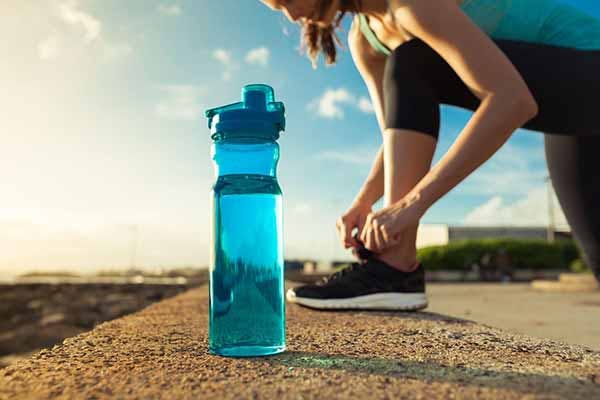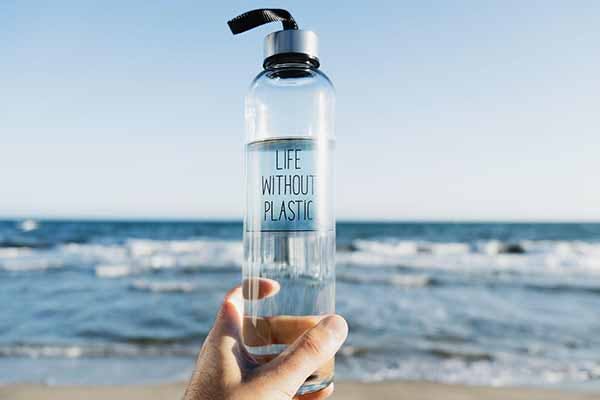May 2022
How Many Water Bottles Should I Drink a Day?
Many of you may wonder, "How many water bottles should I drink in a day?" But then what often follows may be a bit of guilt about all the plastic you are contributing to the planet.
Still, you know that drinking water is essential. Sufficient daily water intake is vital to your health and wellbeing. The health benefits of plentiful water consumption are numerous, ranging from maintaining a healthy body temperature to weight loss to sufficient hydration, and even avoiding constipation, or worse, health issues like kidney stones.
So how do you get enough water to adhere to the recommended amount of daily water consumption without leaving an ugly impact on the planet?
Fortunately, there are many ways to get the amount of water you need in your daily regimen and take care of the planet too.
So, how much water should you drink and should you concern yourself with water filtration or water softening? These answers and more to follow.
Want to reduce water bottle waste? Explore the best water filter pitchers.
How Does Hydration Help You Stay Healthy From Head to Toe?
Fluid intake is vital to your survival — after all, your body is made up of 60% water! The need for sufficient hydration is something humans share with all living things.
The essential functions of your body depend on water. When you breathe and sweat, water helps keep your body temperature regulated. It also acts as a lubricant to the highway that carries nutrients through your bloodstream, and it helps your body rid itself of toxicants and waste through your urine. H2O even lubricates your joints, keeps your mouth moist, and keeps your electrolytes balanced.
You may find it interesting to know that your brain is made up of approximately 80% water. That means that drinking plenty of water is necessary to keep your brain functioning properly. Water will help boost your memory, regulate your mood, and positively impact your focus, decision-making capabilities, and even your energy levels.
Is Drinking Water the Only Way to Get the Water Content You Need?
While drinking water every day is important to get enough fluids into your body, a healthy adult probably meets most of their body's water content needs through healthy eating and drinking other fluids.
Many fruits and vegetables have a high water content. Watermelon is a perfect example, but you may be surprised to find that eating apples, celery, lettuce, zucchini, cucumbers, bell peppers, tomatoes, and spinach, among other foods, will add to your water intake as well.
Still, experts suggest that plain water is best for our bodies (especially for maintaining a healthy weight) and that we can be sure to meet our water content needs by drinking extra water throughout the day.
How Many Water Bottles Should You Drink a Day?
Some sources suggest that the best way to meet your hydration needs is by drinking roughly half your body weight in equivalent ounces of water. For example, if you weigh 130 pounds, a good rule of thumb would be to drink about 65 fluid ounces of water per day.
Since a typical single-use plastic bottle of water is just under 17 ounces, that's nearly four bottles of water per day. Now, that's a lot of plastic headed to our landfills and oceans, but more on that later.
The National Academies of Sciences is another organization that weighs in on the amount of water you should drink each day, stating that about 2.7 liters for women and 3.7 liters of water for men per day are about right. That would be about 5-6 bottles of water for women and 7-8 bottles for men.
Can Drinking Plenty of Water Help Me Lose Weight?

Drinking plenty of water can help you lose weight. But, of course, when combined with healthy eating and a healthy activity level, your chances of weight loss will increase.
But what is “plenty of water”? Studies show that drinking a full glass of water before meals helps reduce your calorie intake because your stomach feels full, so you're likely to eat less. One study showed that increasing plain water consumption by up to three cups of water a day might decrease daily calorie intake by as many as 205 calories. That has the potential to significantly reduce your calorie intake over time, resulting in more significant weight loss.
In addition to that, it’s easy to mistake hunger pangs with thirst. So if you're feeling hungry but you've already eaten, you might just be thirsty. Try downing a nice tall glass of water before you head for the refrigerator or pantry.
Finally, drinking a sufficient amount of water helps keep your body from water retention, which can cause bloating, making you look heavier than you are.
How Do I Know if I'm Not Drinking Enough Water?
There are numerous ways that your will body lets you know if you're not getting enough water. A dry mouth is probably your first indication of mild dehydration. A headache is another sign.
Suppose you are doing intense exercise or breastfeeding. In those cases, you may feel the signs of dehydration if you aren't drinking enough water.
Other signs that you're not getting enough water include:
- Dark urine
- A lack of sweat despite being out on a hot day or engaging in heavy activity
- A craving for salty foods
How Can I Reduce My Use of Bottled Water?

source
You may be wondering how you can consume enough bottles of water without polluting the planet with copious amounts of plastic. As previously mentioned, a person weighing 130 pounds would need to drink about four bottles of water a day. That adds up to 1,460 plastic water bottles per year that eventually would end up in landfills or oceans.
While you're bound to feel good about taking care of your health, your self-esteem could take a hit just from the sheer shame of adding to your carbon footprint. In addition to that, you'll be inadvertently affecting your health by affecting the health of the planet.
Not to worry. There are a few eco-friendly solutions that you can implement to help ensure your health and that of Mother Earth.
Get a Reusable Water Bottle
We recommend investing in a quality reusable water bottle that you can refill with fresh, cold water throughout the day.
There are hundreds of options on the market, and depending on your preferences, you should be able to find one that perfectly suits your needs.
Stainless steel insulated water bottles help keep your water cold all day. The benefit of drinking cold water is that your resting energy expenditure can increase by nearly 30% for up to an hour after drinking it. That means you burn calories just by enjoying a cold drink of water.
From flip-top caps or built-in straws to bottles with carrier handles and even built-in rotating hydration meters, the sky's the limit when it comes to choosing the perfect water bottle for you.
In fact, why not get a few? Keep a bottle by your bedside, one on your desk, and another in your car to refill throughout the day, every day.
There are hundreds of water bottle brands out there that will do the job of helping you stay eco-friendly and hydrated.
Opt for a Water Filtration System
Installing a home water filtration system will improve your drinking water's overall purity, taste, and smell. It can also lower the pH level of the water that you drink. The best part, though, is that you always have clean, filtered water at your fingertips; this allows you to refill your eco-friendly water bottles throughout the day.
You can choose a point-of-use system that places the filtration equipment underneath your sink, or you can go with a whole-house water filtration system so that your water is filtered and safe no matter where you're getting it from.
Not only does a water filtration system purify your water from contaminants, but it also can soften it, eliminating the need for an additional water softening system. Some common contaminating chemicals in your water may include chloramine, ammonia, fluoride, or pesticides, among other things.
Recycle Your Plastic
Now and then, we all find ourselves compelled to buy bottled water. Perhaps you're out and about running errands or traveling, and you just can't take along your water from home.
The happy news for our planet is that we can reuse plastic by simply doing our part to sort our trash and recycle plastic, paper, glass, and aluminum.
Stay Hydrated With Filtered Water in an Eco-Friendly Bottle
There is such a thing as drinking too much water, which can cause hyponatremia (overhydration). So, stick to the recommended amounts. And do your part for your body and planet by using a reusable water bottle and getting your water from a clean source, like a good water filtration system.
Want to learn more about which kind of system may be best for you? Reach out and talk to one of our specialists today.
Brought to you by homewater.com
All images licensed from Adobe Stock.
Featured Image